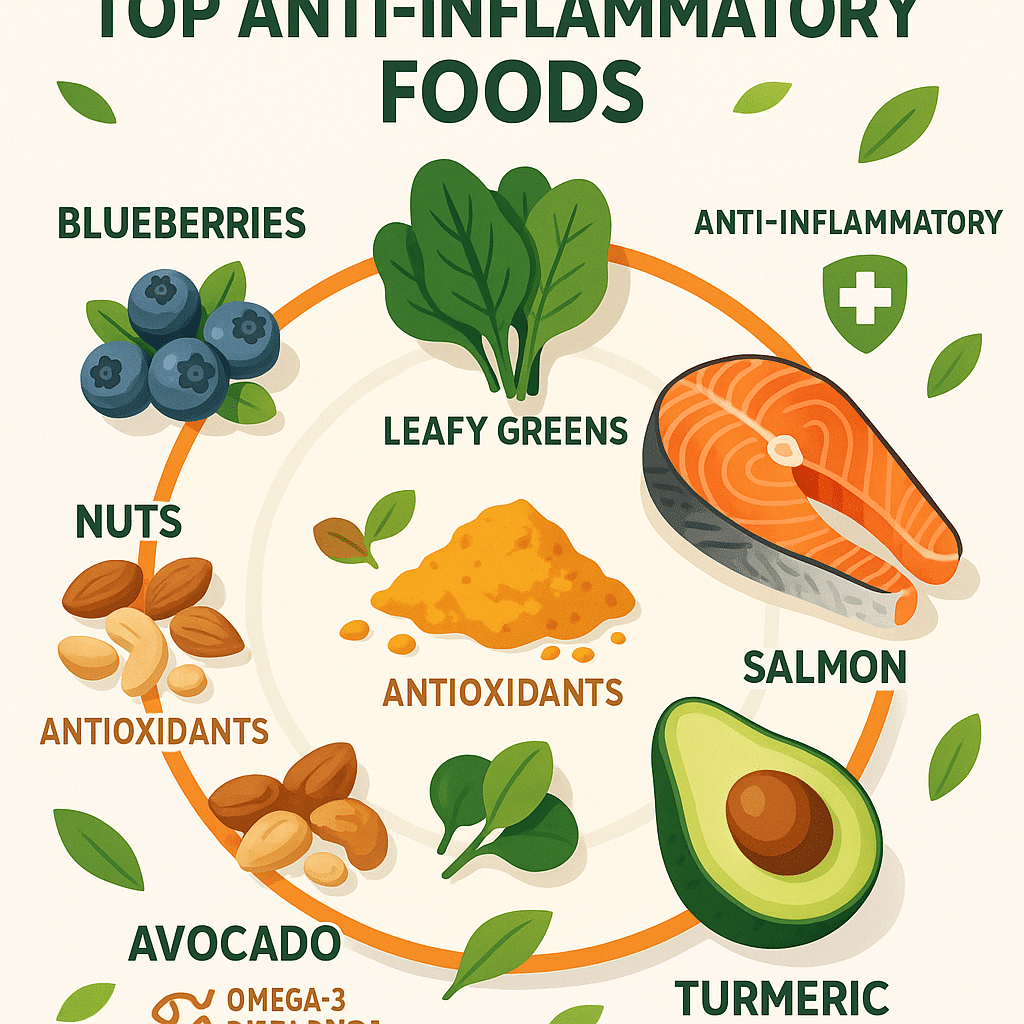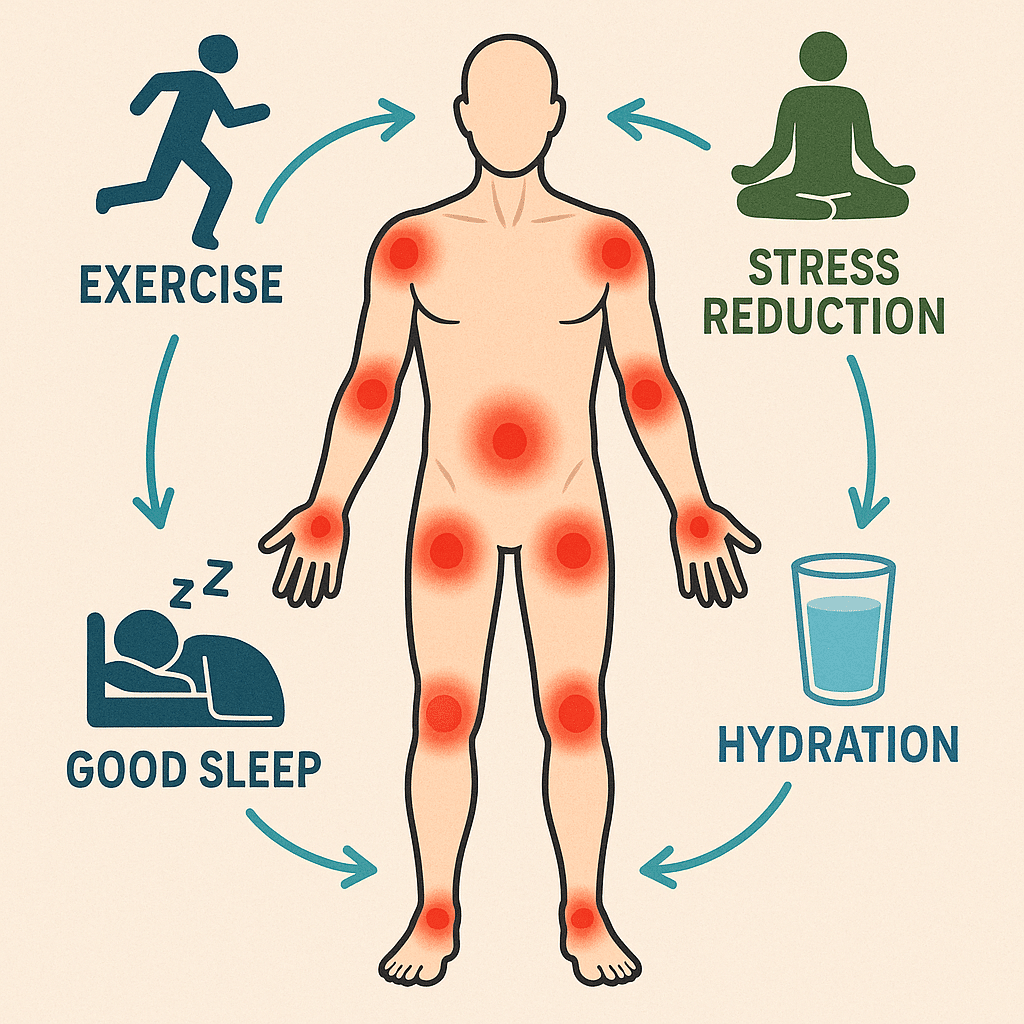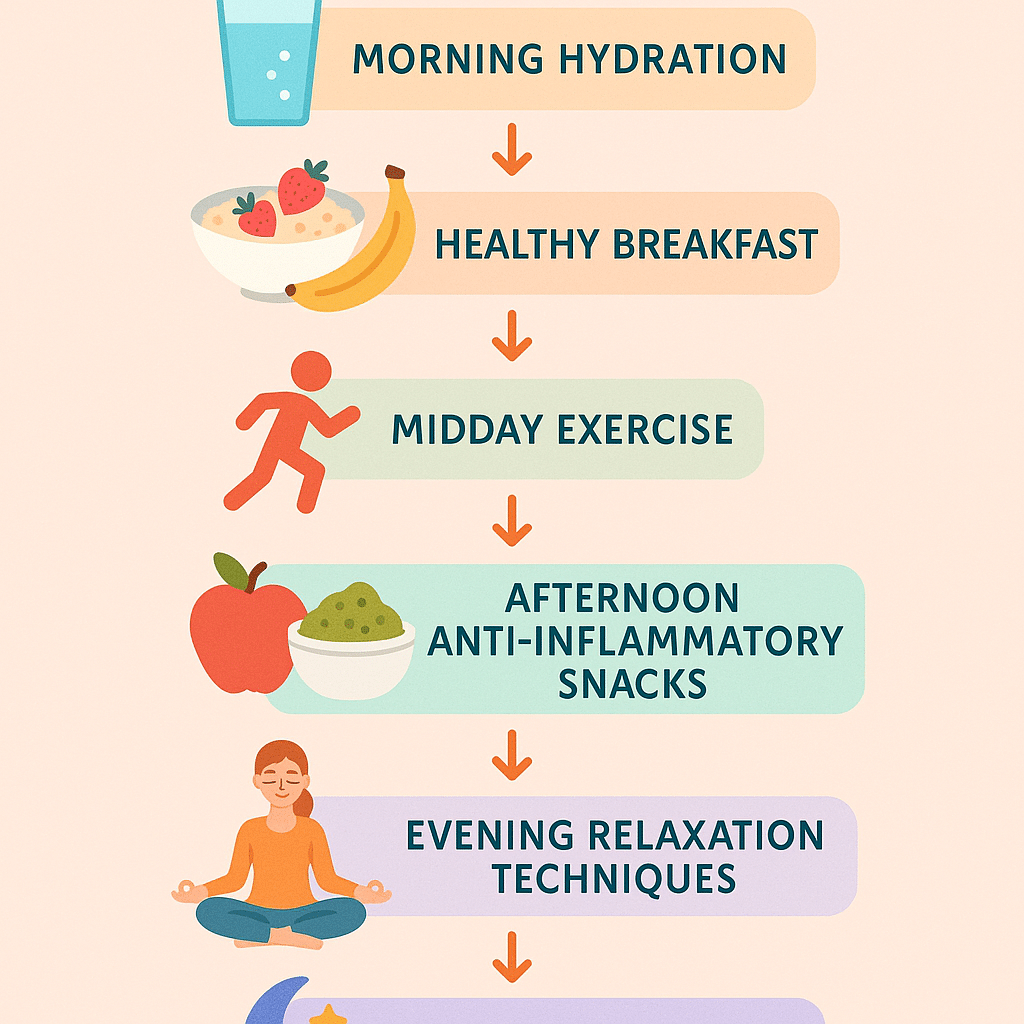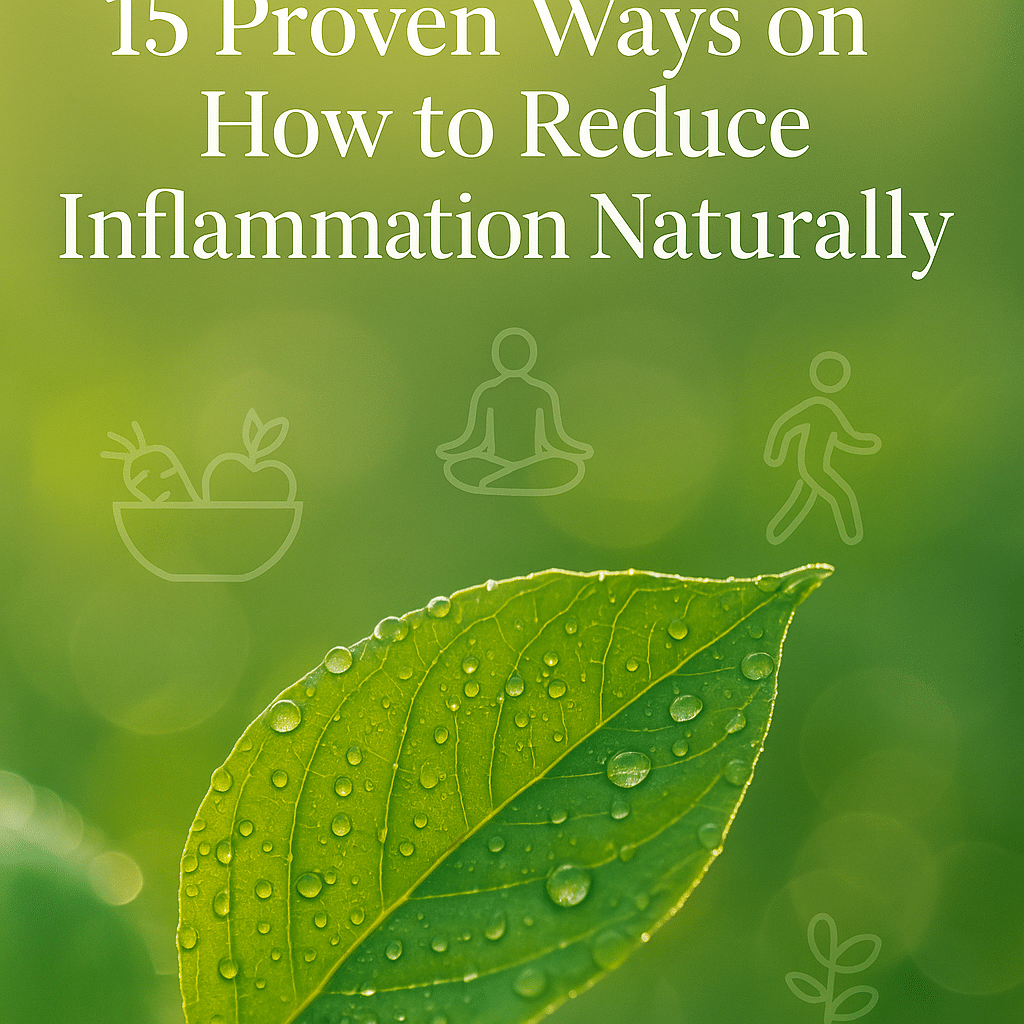Inflammation is something many of us hear about, but few realize how deeply it influences our overall health. Whether it stems from an injury, stress, or diet, inflammation can sneak up quietly, sometimes turning chronic and causing a host of unwanted symptoms. If you’re someone who values natural wellness and wants to know how to reduce inflammation naturally, you’re in the right place. In this comprehensive guide, we’ll explore the nature of inflammation, its causes, and — importantly — 15 well-researched, effective ways to calm inflammation naturally.
From understanding the difference between acute and chronic inflammation to uncovering the best foods, lifestyle tweaks, exercises, and cutting-edge therapies, your journey toward a less inflamed, more vibrant life starts here. I’ll share evidence-backed insights and practical advice so you can confidently take charge of your health and reduce inflammation without relying solely on medications. Let’s dive in.
Understanding Inflammation: Causes and Chronic Symptoms

Inflammation is your body’s natural response to injury or infection. Think of it as your immune system’s way of fighting off harm. While acute inflammation is a short-term, beneficial process helping your body heal, chronic inflammation is a different beast — lingering and often silent, causing damage over time.
The Role of Acute vs. Chronic Inflammation in Health
Acute inflammation is your body’s frontline defense. You might notice it as redness, swelling, or pain right after you cut your finger or twist your ankle. This type usually resolves itself within days once healing starts.
Chronic inflammation, however, lingers for weeks, months, or even years. It’s often caused by unresolved infections, autoimmune diseases, or lifestyle factors such as poor diet, stress, lack of exercise, or environmental toxins. This type can slowly damage tissues and has been linked to conditions like heart disease, diabetes, arthritis, and even some cancers.
Common Chronic Inflammation Symptoms to Watch For
Often, chronic inflammation hides in plain sight, showing up as vague symptoms such as:
- Persistent fatigue or feeling tired without clear reason
- Ongoing aches and pains, especially in joints and muscles
- Digestive issues like bloating or irritable bowel syndrome (IBS)
- Skin problems including rashes or eczema
- Frequent infections or slow wound healing
- Brain fog or difficulty concentrating
Recognizing these signals early can help you take action to reduce inflammation naturally and maintain your health.
The Science Behind Natural Inflammation Reduction

When it comes to natural strategies, knowing why they work helps you stick with them. Central to inflammation is oxidative stress—an imbalance between harmful free radicals and your body’s ability to neutralize them with antioxidants.
How Inflammation and Oxidative Stress Are Linked
Free radicals are unstable molecules that damage cells, triggering inflammation as your immune system responds to the injury. Chronic oxidative stress perpetuates inflammation, creating a vicious cycle.
By introducing antioxidants through diet and lifestyle, you can break this cycle and reduce inflammatory markers like C-reactive protein (CRP) in your blood. Science shows that these natural anti-inflammatory agents help calm that chronic fire inside.
Reducing Inflammatory Markers Through Lifestyle
Aside from diet, stress management, sufficient sleep, and regular physical activity play crucial roles in lowering inflammation. When we neglect these factors, inflammation can spiral, impacting virtually every organ.
I’ve seen firsthand how clients adopting these lifestyle shifts report better energy and fewer symptoms, thanks to lowered inflammatory markers.
Anti-Inflammatory Diet Foods That Heal

You truly are what you eat, especially when it comes to inflammation. Choosing the right foods introduces powerful compounds that fight inflammation from the inside out.
Best Foods to Reduce Inflammation Naturally
Omega-3 Fatty Acids: Benefits and Sources
Omega-3 fatty acids are superstar inflammation fighters. They help decrease the production of pro-inflammatory molecules and promote the creation of inflammation-resolving agents.
Great sources include fatty fish like salmon, mackerel, and sardines. If you’re plant-based, flaxseeds, chia seeds, and walnuts are excellent options, too. Adding these regularly to your diet is an easy and delicious way to lower inflammation.
Antioxidant-Rich Fruits and Vegetables
Fruits like berries (blueberries, strawberries), cherries, and oranges pack antioxidants such as vitamin C and flavonoids, which neutralize free radicals. Vegetables such as spinach, kale, broccoli, and Brussels sprouts add fiber and phytonutrients that support gut health and immunity.
Whole Grains and Fiber’s Role in Reducing Inflammation
Whole grains like quinoa, brown rice, and oats contribute fiber that feeds beneficial gut bacteria. A healthy gut reduces intestinal inflammation and keeps your immune system balanced, reducing overall inflammation.
Natural Anti-Inflammatory Herbs and Spices to Include
Turmeric, Ginger, and Other Herbal Supplements
Turmeric’s active compound, curcumin, has been widely studied for its anti-inflammatory properties. Similarly, ginger helps block inflammatory pathways. Other herbs like rosemary, cinnamon, and green tea contain anti-inflammatory polyphenols, making them great additions to your meals.
Flavoring Tips: Using Spices to Maximize Benefits
Incorporate fresh or powdered turmeric and ginger in cooking, smoothies, or teas. Adding a pinch of black pepper enhances turmeric absorption, improving effectiveness. Experimenting with these spices can make your diet exciting and inflammation-fighting.
Foods to Avoid to Help Lower Inflammation

What you leave off your plate can be just as crucial as what you add.
Pro-Inflammatory Foods and Their Impact
Refined carbohydrates, sugary snacks, and drinks, as well as processed meats (think sausages, bacon), are notorious for triggering inflammation. They raise blood sugar rapidly and encourage inflammatory responses.
Hidden Sugars, Processed Foods, and Unhealthy Fats
Watch out for hidden sugars in sauces, dressings, and packaged goods. Trans fats and excessive omega-6 fatty acids (found in fried foods and many vegetable oils) can promote inflammation when consumed in excess.
Cutting back on these foods supports your anti-inflammatory diet plan.
How to Reduce Inflammation Naturally with Lifestyle Changes
Diet is just one piece of the puzzle. Lifestyles play a massive role in controlling chronic inflammation.
Stress and Inflammation: Understanding the Connection
Chronic stress floods your system with cortisol, a hormone that, in prolonged high levels, can promote inflammation. Managing stress becomes essential for inflammation control.
Mindfulness, Meditation, and Stress Reduction Techniques
Practices like mindfulness meditation, deep breathing exercises, and progressive muscle relaxation lower stress hormones and ease inflammation. Even just 10 minutes daily can make a marked difference.
Quality Sleep and Its Role in Inflammation Control
Sleep deprivation increases inflammatory markers and weakens immunity. Aim for 7-9 hours of quality sleep, keeping your bedroom cool, dark, and tech-free before bedtime.
The Impact of Smoking and Alcohol on Inflammation
Smoking damages blood vessels and increases inflammatory chemicals. Excessive alcohol can also worsen inflammation while disrupting sleep patterns and gut health. Reducing or quitting these habits supports your body’s healing process.
Exercises That Reduce Inflammation Naturally
Regular movement is a cornerstone strategy in how to reduce inflammation naturally.
Low-Impact Activities: Yoga, Walking, and Tai Chi
These exercises improve circulation, reduce stress, and help maintain joint flexibility without stressing the body. Yoga and Tai Chi especially combine gentle movement with mindfulness, further easing inflammation.
How Regular Physical Activity Lowers Inflammatory Markers
Engaging in 150 minutes of moderate exercise weekly lowers CRP and other inflammatory markers. It also aids weight management, another factor linked to inflammation. The key is consistency and finding activities you enjoy.
Hydration and Inflammation: The Power of Water and Herbal Teas
Water flushes out toxins and supports cellular function, vital for reducing inflammation.
Best Teas for Reducing Inflammation Naturally
Herbal teas such as green tea, chamomile, and ginger tea contain antioxidants and anti-inflammatory compounds. Sipping these throughout the day supports inflammation reduction while offering a comforting ritual.
Gut Health and Its Crucial Role in Managing Inflammation
The gut houses a large part of your immune system. A balanced gut microbiome translates to less inflammation.
Probiotic and Fermented Foods to Include
Foods like yogurt, kefir, sauerkraut, kimchi, and kombucha introduce beneficial bacteria that balance gut flora, reducing gut-originated inflammation.
Prebiotic Foods and Their Anti-Inflammatory Effects
Prebiotics, fibers found in foods like garlic, onions, asparagus, and bananas, feed good bacteria, enhancing their anti-inflammatory effects.
Natural Supplements to Reduce Inflammation Effectively
Supplements can complement your diet to further calm inflammation.
Popular Natural Anti-Inflammatory Agents and Their Uses
Curcumin, omega-3 fish oil supplements, boswellia, and resveratrol have scientific backing as natural anti-inflammatory agents. However, it’s crucial to choose high-quality products and consult healthcare professionals before adding new supplements.
How to Choose Quality Supplements Safely
Look for third-party tested brands available through trusted retailers. Avoid exaggerated claims and always adhere to recommended dosages.
Developing an Anti-Inflammatory Diet Plan for Beginners
Starting small and building habits is key.
Simple Meal Ideas and Anti-Inflammatory Smoothie Recipes
Start your day with a berry, spinach, and flaxseed smoothie blended with turmeric and ginger. Lunch could be a quinoa salad with leafy greens and salmon. Dinner might include roasted veggies with turmeric-spiced lentils.
Tips for Sustaining Long-Term Dietary Changes
Keep meals colorful and variety-driven. Involve loved ones, plan meals ahead, and celebrate small wins to maintain momentum.
Unique Insight: The Emerging Role of Red Light Therapy in Reducing Inflammation
Beyond diet and lifestyle, red light therapy is gaining attention.
Science Behind Red Light Therapy and Its Anti-Inflammatory Potential
Red light penetrates skin to stimulate cellular repair and reduce oxidative stress. Studies suggest it can lower inflammation and speed healing in joints and muscles.
How to Integrate Red Light Therapy into Your Wellness Routine
Home devices or professional sessions are available; starting with short daily treatments focused on affected areas can enhance your inflammation management arsenal.
Tracking Progress: How to Monitor and Maintain Lower Inflammation Naturally
Keeping track helps you stay motivated and adjust as needed.
Key Metrics and Symptoms to Track
Monitor symptom changes, energy levels, sleep quality, and if possible, have inflammatory markers checked through blood tests regularly.
Adjusting Lifestyle and Diet Based on Individual Responses
Not all strategies work equally for everyone. Pay attention to what feels best, seek professional advice if needed, and be flexible in your approach.
Quick Takeaways
- Chronic inflammation is linked to many health issues but can be managed naturally through diet, lifestyle, and supplements.
- Foods rich in omega-3 fatty acids, antioxidants, and fiber are your best allies.
- Avoid pro-inflammatory processed foods, sugars, and unhealthy fats.
- Stress reduction, quality sleep, and regular exercise profoundly influence inflammation levels.
- Incorporating natural herbs like turmeric and ginger boosts anti-inflammatory effects.
- Gut health via probiotics and prebiotics plays a critical role in inflammation control.
- Emerging therapies like red light therapy offer promising benefits in inflammation management.
Frequently Asked Questions (FAQs)
Q1: What are the best foods to reduce inflammation naturally?
A1: Foods rich in omega-3 fatty acids (salmon, flaxseeds), antioxidant-rich fruits (berries, oranges), leafy greens (spinach, kale), and whole grains are some of the best anti-inflammatory foods.
Q2: Can natural remedies help with chronic inflammation?
A2: Yes, natural remedies such as turmeric, ginger, regular exercise, mindfulness techniques, and dietary changes are effective in reducing chronic inflammation without medication.
Q3: How do exercises reduce inflammation naturally?
A3: Regular moderate exercise helps lower inflammatory markers by improving circulation, reducing excess body fat, and decreasing stress hormones linked to inflammation.
Q4: Which herbs and spices are natural anti-inflammatory agents?
A4: Turmeric, ginger, cinnamon, rosemary, and green tea have scientifically proven anti-inflammatory properties.
Q5: Can lifestyle changes alone reduce inflammation?
A5: Absolutely. Managing stress, improving sleep quality, quitting smoking, limiting alcohol, and staying physically active are powerful ways to naturally reduce inflammation.
Conclusion
Understanding how to reduce inflammation naturally is empowering, especially when you can embrace strategies supported by science and centuries of traditional wisdom. Chronic inflammation, though subtle at times, has far-reaching effects on your overall health and well-being. By incorporating anti-inflammatory foods like omega-3-rich fish, vibrant fruits and vegetables, and healing herbs, alongside lifestyle modifications such as stress management, regular exercise, proper hydration, and quality sleep, you set your body on a path to healing and vitality.
The journey isn’t about perfection but consistency and awareness. Remember, reducing inflammation naturally is not only about adding years to your life but life to your years. Whether through delicious meals, soothing herbal teas, or even innovative options like red light therapy, your toolbox for managing inflammation is broad and accessible.
I encourage you to take these insights to heart, try different strategies, and listen to your body’s responses. Your health-conscious mindset is your biggest asset, and armed with knowledge and action, inflammation will no longer control your life. Here’s to a healthier, inflammation-free you!
External Links for Further Reading and Quality Products
- Turmeric Supplements – Gaia Herbs
- Omega-3 Fish Oil – Nordic Naturals
- Mediterranean Diet Guidelines – Oldways
- Mindfulness Meditation Resources – Mayo Clinic
- Red Light Therapy Devices – Joovv
Thank you for reading, and here’s to your journey toward natural wellness!

